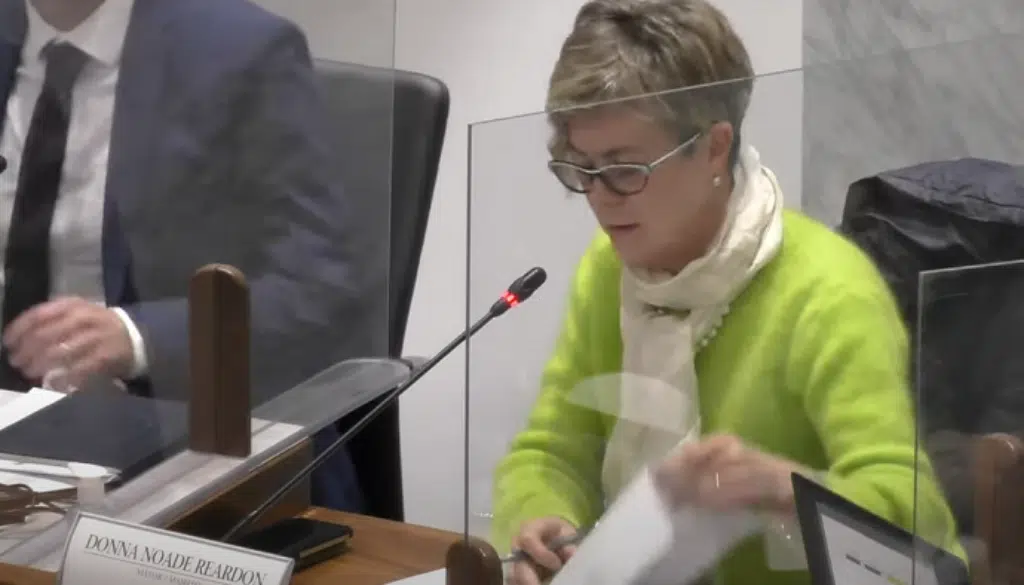Deputy Mayor John MacKenzie’s motion calling on the city to ask the federal and provincial government for a “guaranteed livable basic income” got unanimous support from the city council earlier this week.
A guaranteed livable basic income will be attached to a certain level of a market-based level of poverty, as opposed to a universal basic income. The funding for a basic income would not come from municipalities but from federal and potentially provincial governments.
The motion says the impacts of poverty have placed “unsustainable pressure on [Saint John’s] limited resources to deliver necessary public services and social infrastructure supports as we struggle to keep up with the evolving needs of our community.”
It calls on the council to direct “the Office of the Mayor to write a letter to the Prime Minister, New Brunswick Members of Parliament and the Senate, the Premier of New Brunswick, Members of the Legislative Assembly of New Brunswick, and the Fundy Regional Service Commission, calling on these orders of government to work towards implementing a Guaranteed Livable Basic Income to eradicate poverty and homelessness, and ensure everyone has sufficient income to meet their basic needs.”
“It’s a great idea,” said mayor Donna Reardon during the vote on the motion.
Saint John joins Fredericton, Moncton and Halifax who have all passed similar motions.
Specifically, the motion proposed that this basic income would help “alleviate pressures on municipalities to address poverty and fill gaps in social supports, such as shelter, housing, food security and mental health.”
Late last year, Food Banks Canada released its Hunger Count report, which found food bank use in New Brunswick was up by 17 per cent from March 2021 to March 2022. Inflation played a significant role in the uptick.
And in December the Salvation Army in Saint John opened an additional emergency shelter at the former Hilton Belyea Arena, with help from the provincial and municipal governments, due to an increase in the need for the service.
Surprisingly, employment levels, labour force size and median hourly income have all increased in the past year, while the rate of unemployment in the city has dropped, according to Envision Saint John’s economic dashboard.
After peaking sharply in 2019/2020 employment insurance beneficiaries have also declined sharply in the past 2-3 years. For example, in 2020 there were 6,209 Saint Johners on EI per 100,000 population, while in 2022 that number was cut in half to 2,529.
During that same time period, the city’s labour force grew from 70,700 in 2019 to 71,200 in 2022, while the labour force participation rate shrunk from 64.6 per cent in 2019 to 62.5 per cent in 2022. And yet the job vacancy rate in Saint John increased from 2.9 per cent in 2019 to 4.4 per cent in 2022.
In an apparent labour shortage situation, why would there be a need for basic income?
Wil Robertson, an organizer with Basic Income New Brunswick as well as a steering committee member of Coalition Canada Basic Income, was on hand at the council session to answer questions about the motion. In an interview with Huddle, Robertson says that there is a number of different factors affecting labour markets across Canada in the wake of Covid.
A significant number of people decided to retire early, and there were permanent shifts out of the hospitality sector by droves of workers, with many of them still in the process of retraining for new careers.
While the country and the city continue to work through the aftermath of the labour disruptions caused by Covid, the rising need for food and shelter should also be addressed.
The cost to implement a guaranteed basic income nationally was determined to be $85 billion when the Parliamentary budget officer looked at the issue in 2021, with the cost anticipated to rise to $93 billion in 2025-26. The anticipated benefit of the program is a halving of poverty in Canada.
The Ontario basic income pilot project was used as the model for the costing exercise. In that project, participants were selected based on having an annual income of $23,000 or less for a single person. They were eligible to receive up to $17,000 individually, or $24,000 for a couple, to supplement their incomes.
Robertson says spending on a basic income will save money elsewhere.
“Savings in the healthcare system, there are fewer people going to the doctor less often. Fewer people need medication because they can afford healthy foods … lower rates of recidivism so people are not committing crime as often.”
He notes that for the Ontario pilot project, the reliability of income allowed people to budget and make better choices with how they spent their money. When the three-year pilot was cut short after one year following the election of a new government in Ontario, participants in the project filed a $200 million lawsuit against the province, which is ongoing.
“What we’re trying to do with a guaranteed livable income is give people financial stability, and peace of mind,” he says. “In the Ontario Basic Income Pilot people started small businesses, people in the arts were able to pursue their dreams, families going through tough times or single parents were able to afford to get their children medication.”
“People reported having better mental health, physical health, better diets, were happier,” he says.
“People were able to live with dignity.”
Alex Graham is a reporter with Huddle, an Acadia Broadcasting content partner.







